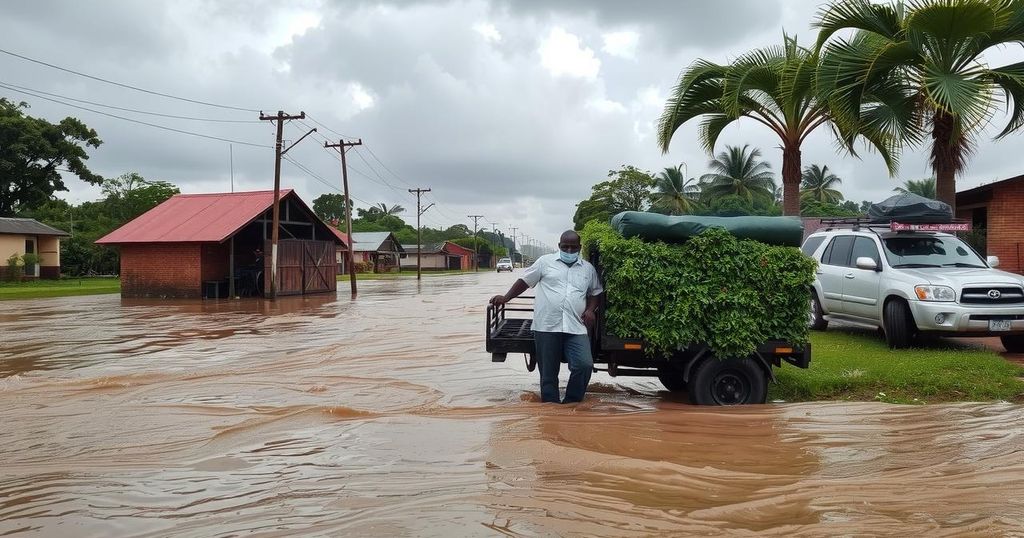The Intensifying Impact of Climate Change on African Flooding: A Scientific Assessment

A new study by the World Weather Attribution network reveals that climate change has intensified flooding in Africa, particularly affecting Sudan, Chad, and Nigeria. Human-caused warming has increased rainfall by up to 20%, leading to hundreds of deaths and millions displaced. Experts warn that without a transition from fossil fuels, these extreme weather events are likely to worsen, underlining the need for international support for affected nations.
According to a recent study published on Wednesday, human-induced climate change has significantly exacerbated flooding events that have resulted in hundreds of fatalities and the displacement of millions across nations such as Cameroon, Chad, Niger, Nigeria, and Sudan during this year. These severe flooding events have been particularly prevalent in the Sahel region, which borders the Sahara Desert, triggering a major humanitarian crisis. A detailed analysis conducted by the World Weather Attribution (WWA) network of scientists has revealed that the warming caused by fossil fuel consumption has intensified flooding in Sudan. The study indicates that climate change has augmented this year’s intense rainfall by approximately five to twenty percent in the Niger and Lake Chad basins, building on previous findings related to similar flooding patterns in 2022. Clair Barnes, a representative from the Center for Environmental Policy at Imperial College London, remarked, “This is only going to keep getting worse if we keep burning fossil fuels,” highlighting the potential for increasingly severe rainfall events to occur annually if the global temperature escalates by two degrees Celsius above pre-industrial levels. Moreover, the researchers noted that the manifestation of global warming extends beyond mere temperature increases, as the additional heat retained in the atmosphere and oceans generates more severe downpours and storms. The study primarily addressed the plight of flood-affected regions in war-torn Sudan, where ongoing conflict has displaced millions and forced them into areas susceptible to flooding. By employing modeling techniques, the researchers compared weather patterns in the context of human-induced warming versus a scenario without it, concluding that the likelihood and intensity of prolonged periods of heavy rainfall in Sudan have significantly risen due to climatic changes. Currently, with a recorded warming of 1.3 degrees Celsius, the occurrence of such extreme rainfall events is anticipated to rise to once every three years, with precipitation intensifying by roughly ten percent as a consequence of climate change. Izidine Pinto, a researcher from the Royal Netherlands Meteorological Institute, expressed his deep concern regarding these findings, stating, “These results are incredibly concerning,” and cautioned that “with every fraction of a degree of warming, the risk of extreme floods will keep increasing.” Pinto further urged for a hastened transition away from fossil fuels in light of the upcoming UN COP29 climate summit. Joyce Kimutai, also a researcher at Imperial’s Center for Environmental Policy, emphasized the urgent necessity for a loss and damage fund to support nations adversely affected by climate change. She noted that despite Africa’s minimal contribution to global carbon emissions, it continues to suffer severely from extreme climatic phenomena. Additionally, the study indicated that the flooding crisis is exacerbated by other anthropogenic factors, prompting calls for enhanced maintenance of dams and investments in early warning systems.
The Sahel region of Africa is increasingly vulnerable to climate change, which has intensified weather extremes, including severe flooding. The humanitarian crises resulting from such phenomena raise significant concerns for public health, safety, and socioeconomic stability in multiple countries. Understanding the scientific links between climate change and extreme weather events is critical for policymakers, as these findings can aid in formulating effective strategies to mitigate future disasters and support affected populations. The ongoing debate surrounding climate financing for developing countries, particularly in the face of their minimal contribution to global emissions, emphasizes the need for global responsibility and action to combat climate change’s impacts.
The evidence presented in the study underscores a dire warning: human-induced climate change is amplifying flood risks, particularly in already vulnerable regions like the Sahel. The findings suggest an urgent need for global action to transition away from fossil fuels and to establish supportive frameworks for affected nations. The increasing severity of such climatic events not only threatens lives but also challenges the resilience of communities across Africa.
Original Source: phys.org






